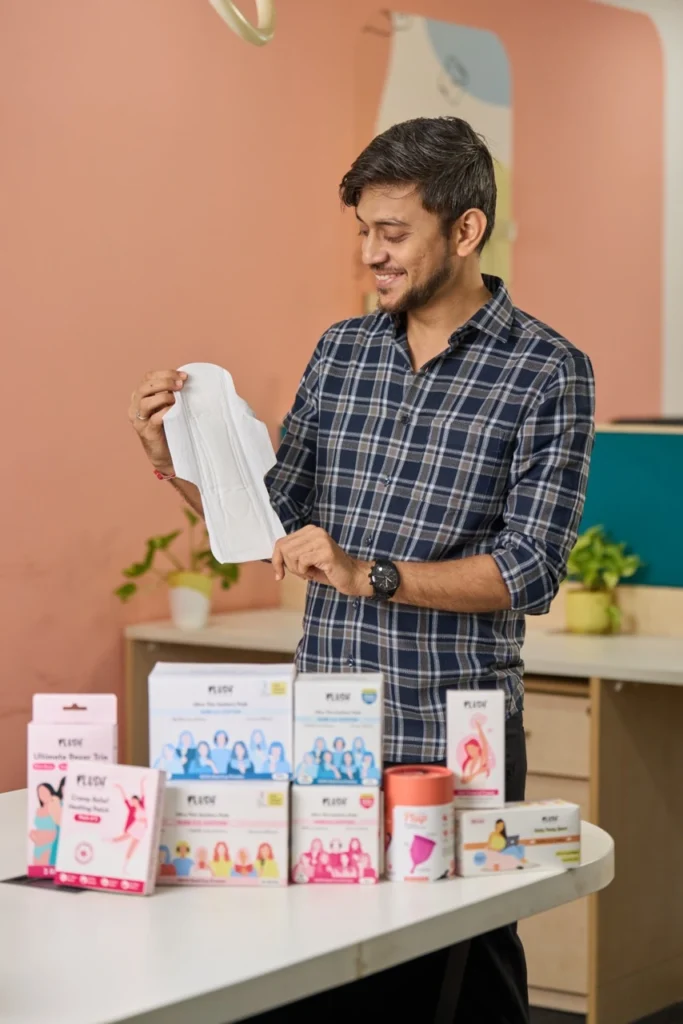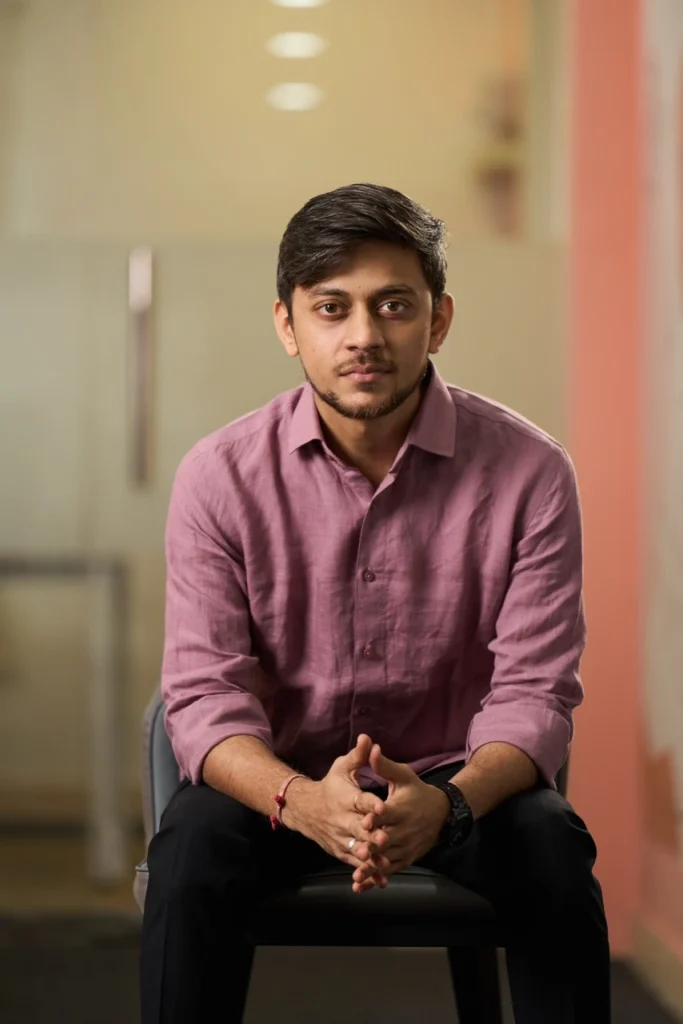Ketan Munoth, co-founder of Plush, is at the forefront of a quiet revolution—one that challenges deep-rooted taboos and reshapes how we think about menstrual wellness in India. As a male entrepreneur leading a women-centric hygiene brand, Ketan has never shied away from asking uncomfortable questions or stepping into conversations traditionally kept behind closed doors. What began as a quest to create safer, more comfortable period products has evolved into a broader mission: to normalize menstrual health as a shared responsibility, not just a “women’s issue.” Through Plush, he has fostered a culture of empathy, education, and transparency—whether it’s promoting period leave in the workplace or encouraging men to support the women in their lives more mindfully. In this exclusive interview with Best for Him, Ketan opens up about stigma, leadership, and why the future of wellness lies in inclusivity, compassion, and breaking the silence—one honest conversation at a time.

1. Why should men care about feminine hygiene?
The question isn’t “why should we care?” but “why wouldn’t we?” Periods are a natural part of life for the menstruators around us – mothers, sisters, wives, daughters. It’s like if you had a friend who had to deal with an issue every month, something that made them uncomfortable or affected their mood. Would you just ignore it because it doesn’t affect you directly? Of course not. Menstruation is no different. We don’t have to fully experience it to understand that the women in our lives deserve comfort, care, and support during that time. If we want to be the best partners, friends, or family members, it’s time to acknowledge and support them during this normal but sometimes challenging part of their lives.
2. What’s the biggest myth about periods that you’ve heard from men?
Oh, there are definitely quite a few! One of the most common ones is the assumption that periods are just about “blood” – like it’s only the physical aspect of menstruation that matters. But the truth is, it’s so much more than that – emotional changes, discomfort, fatigue & more. It’s a whole experience that affects a woman mentally, emotionally, and physically.
Another myth I hear a lot is this idea that women are “overreacting” to period cramps. Many men don’t realize that period cramps can feel like the worst kind of muscle pain, or worse, and they can last for hours – it can be exhausting, frustrating, and really intense.
There’s also the misconception that periods are a “private” issue that women should just deal with in silence. Men often don’t see the mental and emotional load that comes with menstruation – having to plan, adjust schedules, and deal with the social stigma around periods. This silence, or embarrassment, only adds to the stress.
There are so many more myths that are still far too common, and it’s time we break the cycle of ignorance and start supporting women more genuinely. Being informed is key – so let’s stop guessing and start learning!
3. Do you think men are becoming more comfortable buying or discussing period products?
Yes, definitely. There’s been a slow yet noticeable shift. Men are starting to realize that menstruation isn’t just a “women’s issue” – it’s part of life, and they’re becoming more open to understanding it. They’re not just buying products for their partners or daughters, but also engaging in conversations around it. It’s about breaking the stigma, and as more men step up, the more normalized it becomes. We’re moving towards a place where period care isn’t seen as awkward, but just another part of caring for the people in our lives.
4. How is poor menstrual hygiene a public health issue—not just a ‘women’s problem’?
Poor menstrual hygiene isn’t just a personal issue – it’s a public health issue that touches everyone. When women don’t have access to safe, hygienic products, it can lead to serious infections, illnesses, and even long-term health problems. But it’s not just about individual health – when women suffer, families suffer. Communities lose out. Economies are impacted. Women make up half the world’s population; their well-being directly shapes the well-being of society. If we truly care about public health, we have to care about menstrual health too. It’s everyone’s responsibility, not just women’s.
5. Do you think boys should be taught about menstruation at school?
Absolutely.
Right now, in most schools, when the topic of menstruation comes up, boys are asked to leave the room – and only girls are given “the talk.” What we don’t realize is that in that very moment, we unknowingly set a pattern for the next generation: a belief that menstruation is something private, secret, and not meant to be spoken about with the other gender. A wall gets built without anyone even noticing.
If we truly want to break taboos and create a more understanding world, menstrual education should be given to everyone – boys and girls alike. Because periods are a human experience, not just a “women’s issue.”
For the men reading this – take some time out. Learn about the four phases of menstruation. Really get into it. Understanding the hormonal, emotional, and physical shifts will unlock something beautiful: a deeper connection, a new level of empathy for the women in your life – be it your mother, your partner, your daughter, or your friends. Empathy starts with knowledge. And this small step could change everything for the next generation.
6. Would you ever consider launching a product line aimed at men’s hygiene and wellness?
We already have. Our Intimate Wellness range is designed for all genders.
Our LoveGlove condoms (which are made without benzocaine or any harmful chemicals), our pHlic lubes, PlayWipes & more are loved by everyone, because they’re made keeping people – of all genders in mind. No nasties. No compromises. Everyone deserves products that are safe, effective, and make them feel good.

7. As a male founder of a feminine hygiene brand, have you ever faced skepticism or resistance?
Yes, I have – but I see it as an opportunity, not an obstacle. Honestly, it’s two sides of the same coin.
Some women feel happy, intrigued – they see it as a refreshing change to have a man talking openly about menstruation. It feels like progress.
Others are more skeptical — “What would a guy know about periods?” – and that’s fair too. Periods are deeply personal. I respect that.
But whichever side of the coin we get, our mission stays the same:
To make every menstruator experience their period of comfort.
8. What’s one simple thing a man can do to support the women in his life during their periods?
One of the simplest – and most powerful – things a man can do is: listen.
Really listen. Observe. Learn.
Every woman experiences her period differently. Some might need space, some might crave comfort, some might just need to vent. Take a little time to notice what comforts her – maybe it’s keeping a hot water bag ready, stocking up her favorite snacks, or just being quietly present.
It’s honestly the little things that mean the most. It’s not about grand gestures. It’s about showing that you see her, hear her, and care enough to be there – even if all you’re doing is making sure she’s a little more comfortable in a moment when she’s not feeling her best.
Small efforts create big impact.
9. How would you advise a man who wants to support his partner but feels awkward discussing menstrual health?
First things first – it’s only awkward because we’ve been taught to make it awkward. For years, we’ve brushed periods under the carpet. As men, we’ve been conditioned to not talk about menstruation, to look away when a woman takes out a pad, to act like it’s something shameful or private.
It’s time to break that wall. Break that cycle. If you want to support your partner, start by talking. I mean really talking. Ask her about her cycle. Ask what she needs, what makes her feel better.
You don’t have to know everything – you just need to care enough to listen, learn, and be present. Slowly but surely, you’ll start to understand what comforts her most during her period.
At the end of the day, it’s about showing up. Showing her, in small but real ways, that she’s not alone in it. And honestly, that’s what makes all the difference.
10. You lead a women-centric brand—how do you practice empathy in leadership?
Empathy, for me, isn’t just a leadership skill — it’s a way of being. It starts with truly listening. Not assuming. Not rushing to fix. Just listening to understand.
I try to create a space where every team member, no matter their gender, feels heard, supported, and respected. Especially at a women-centric brand like Plush where more than 80% of our workforce is women, it’s important to understand that a period isn’t just those 5 days – it’s an entire month of different physical and emotional phases. There are days of energy, days of exhaustion & days of overwhelm – which is why we normalize conversations around wellness at work – whether it’s about period leaves, needing flexibility during tough days, or simply acknowledging that it’s okay not to be at your 100% all the time.
At the end of the day, leadership isn’t about standing above. It’s about standing with your people. And I truly believe that when you lead with empathy, you don’t just build a better brand – you build a better world around you.
11. What kind of legacy do you want to leave behind—not just as a founder, but as a man?
I want to leave behind a legacy of compassion, integrity, and real change. Through Plush, I hope we’ve not just sold products – but challenged how the world thinks about female wellness. I want us to be remembered as a brand that truly listened to women – that didn’t assume what they needed, but asked, learned, and built solutions that made their lives easier & more comfortable.
And as a man, I want to show that true strength lies not in silence but in vulnerability, in understanding, and in standing up for issues that may not directly affect you, but deeply impact the people you care about.
I want to create a world where comfort isn’t just found in our products but in conversations too. A world where discussing feminine hygiene and wellness is natural, comfortable, and without hesitation across all genders.